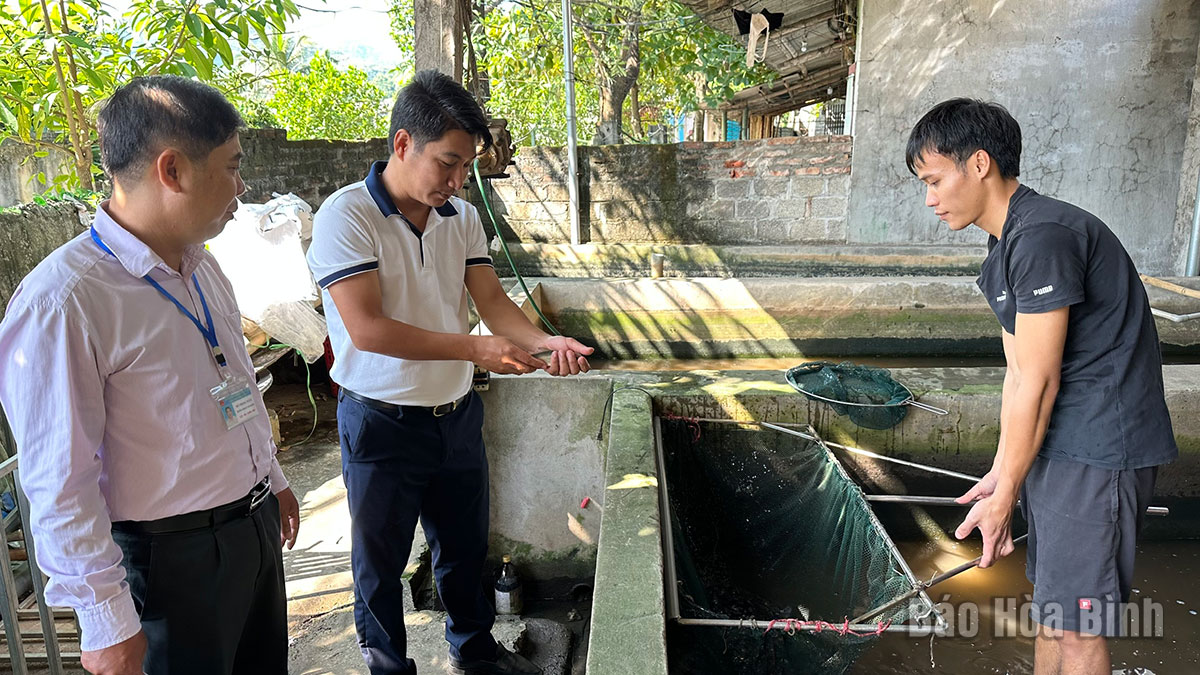
(HBO) – With a quite large system of rivers and lakes and Hoa Binh hydropower reservoir, Hoa Binh province has potential and strengths for aquaculture exploitation and production.
Staff from the fishery sub-department check the quality
of fries before supplying them to the market.
Caged fish farming in the Hoa Binh hydropower reservoir has been developing for
years. Now, there are about 4,940 fish cages in the reservoir, and most of the cased-fish
farms have applied advanced technology, mesh cages, and iron frames. Production
scale gradually shifted from small to larger concentrated production with
advantageous products. The private economic sector deeply participates in
aquaculture production, helping to boost high-quality caged-fish farming.
Therefore, the province's aquatic products in general and Da
river shrimp and fish in particular have strongly expanded to markets outside
the province, especially gradually gaining a foothold in the Hanoi market.
However, reality shows that the proportion of production value
of the fisheries industry in the Hoa Binh reservoir area is not commensurate
with its potential and strengths. Not many fish varieties with high
productivity, quality, and economic value are put into production. The form,
scale, and scope of cooperation in aquaculture do not meet the requirements of
commodity production and are unsustainable. Few businesses have poured large
investments into aquaculture.
Currently, Hoa Binh province aims to develop farming of high-value aquatic
species, focusing on raising caged- fish on large reservoirs for processing and
export.
Accordingly, the province has directed the authorities to study
and find varieties with high economic value, and build a model of raising fish
fingerlings in cages to proactively supply sufficient fingerlings.
The province targets to apply clean and sustainable aquaculture
technology and promote linkage from fries production, farming, processing, and
marketing. It is strictly prohibited to use chemicals that negatively impact
the environment. Agencies must strictly inspect and monitor environmental
developments, promptly warn of disease risks and provide fish farmers with
market information so that they can choose suitable species to raise.
The provincial People's Committee issued a directive document on strengthening
food safety management in aquaculture and trading for domestic consumption and
export.
The committee assigned specific tasks to departments, agencies,
and People's Committees of districts and cities to ensure the quality and food
safety of local agricultural products.
Particularly, the Department of Agriculture and Rural
Development was requested to direct affiliated units to strictly manage the
issuance of food safety certificates to establishments.
The department was asked to coordinate with departments,
agencies and People's Committees of districts and cities to organise programmes
to promote specific agricultural, forestry and fishery products of the province
in domestic and international markets.
For organisations and individuals cultivating and trading
aquatic products, the provincial People's Committee requires them to apply
technical, scientific and technological measures in aquaculture. They are not
allowed to use banned chemicals and antibiotics. They are urged to regularly
upgrade and renovate facilities to improve product quality and packaging
designs to meet consumer tastes.
Producers and traders are urged to actively participate in
domestic and foreign trade promotion programmes to find partners, especially in
foreign markets. They are advised to keep updating technical barriers and
regulations on the quality and food safety of aquatic products of the importing
country to avoid violations, economic losses as well and loss negative impacts
on the local products’ reputation.
Hoa Binh province is undergoing a dynamic transformation amid Vietnam’s national digital transition. Building on Poliburo’s Resolution No. 57-NQ/TW on breakthroughs in science, technology, innovation, and national digital transformation, the province has rolled out a wide range of practical action plans. A standout initiative is the "Digital Literacy for All” movement, an effort to ensure that no one is left behind in the digital era.
Hoa Binh province is undergoing a dynamic transformation in the wake of the national digital transformation movement. Building on Resolution No. 57-NQ/TW of the Politburo on breakthroughs in science, technology, innovation, and national digital transformation, the province has implemented a wide range of practical action plans. A standout initiative is the "Digital Literacy for All” movement ambitious effort to ensure that no one is left behind in the digital age.
With a spirit of unity and proactive problem-solving, the Party Committee, the government and the people of Dong Lai Commune (Tan Lac District) have made great strides in implementing the resolutions of the 24th Party Congress of the commune for the 2020 - 2025 term. Focusing on leadership and practical actions, the commune has brought the Party’s resolutions into daily life, creating strong impacts and pushing the local development forward.
Amid the nationwide push for digital transformation, young people in Hoa Binh Province are stepping up as dynamic pioneers, applying technology to enhance Youth Union operations and expand the reach of youth-led initiatives. Through creativity and adaptability, Youth Union organizations at all levels have introduced a series of practical solutions, contributing to modern governance and community development.
In recent years, An Nghia commune, located in Lac Son district, has stepped up administrative reform, focusing on improving the quality and efficiency of its single-window service unit for receiving and processing administrative procedures. These improvements have helped create favourable conditions for local residents and organisations to handle administrative procedures, contributing to the commune’s broader socio-economic development.
The Prime Minister-approved master plan to develop the multi-use value of forests ecosystems through 2030, with a vision to 2050, aims to improve the management and sustainable use of forest resources, create jobs, increase incomes, and improve the living standards of ethnic minorities, people in mountainous and remote areas, forest workers and those living near forests.



